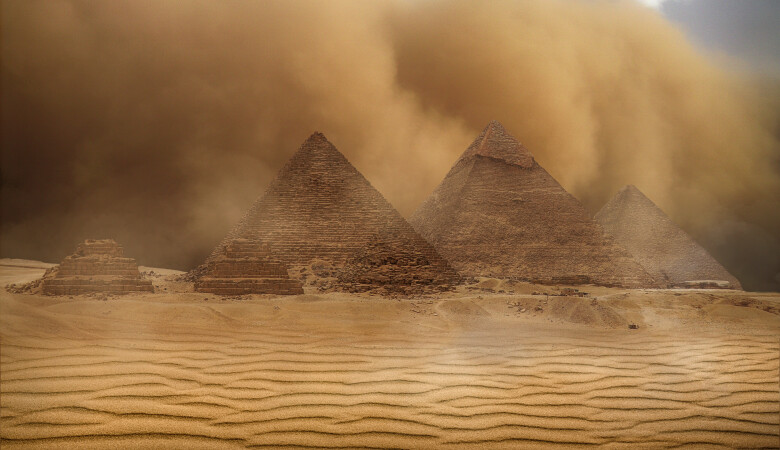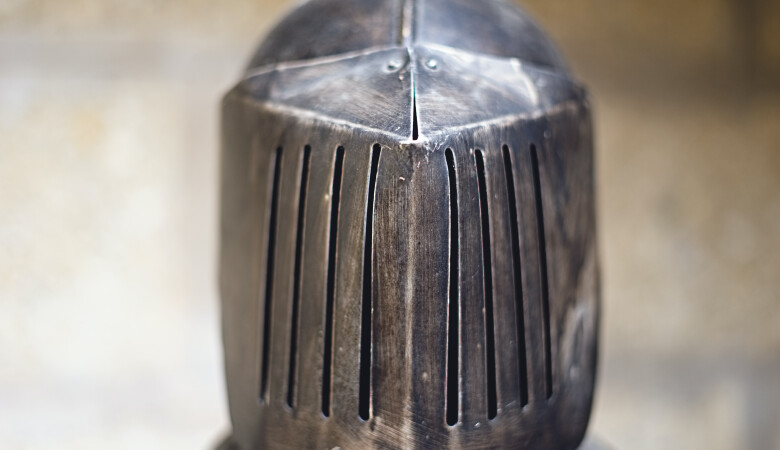The Final Chapter: Eternal Worship vs. Eternal Torment (Isaiah Sermon 79 of 80)
February 19, 2017 | Andy Davis
Isaiah 66:1-24
Hell, Worship
Andy Davis preaches a verse by verse expository sermon on Isaiah 66:1-24. The main subject of the sermon is the difference between true and false worshipers.
- SERMON TRANSCRIPT -
Alright, so we come this morning to the second last sermon, I'm going to preach in the Book of Isaiah, but the last chapter of the book of Isaiah, next week, God willing I'm going to give an overview of the whole Book of Isaiah I could go through this book all over again. I love the Book of Isaiah, I've loved this journey. But next week what I'm going to do is I'm going to trace out specifically Christ in the Book of Isaiah, and the Gospel, and we're going to go from Isaiah 1 to 66 one more time. But this is the last chapter, the final chapter in the book of Isaiah what a fitting conclusion it is Isaiah is the most visionary of all the Old Testament prophets and take an average section of the Book of Isaiah, close your eyes and images come in vision right from the beginning, Isaiah 1:2 the word of the Lord that Isaiah son of Amos, saw it's a vision, And so this most visionary of prophets comes to an incredible and fitting end to his incredible book, and that is a revelation of the eternal state of both the righteous and the wicked, the final chapter of Isaiah divides the human race as we've seen again and again into two categories.
I'm going to unify it around this one idea of true and false worship we're going to follow the idea of worship. There's different ways we could look at this chapter, but we're going to look at true worshipers versus false worshippers. And the outcome. It describes very plainly the heart and behavior of both the true worshippers, and the false worshippers, as well as their eternal destinies, heaven and hell, the Book of Isaiah, ends with the vision of the new heavens and the new earth with Zion the New Jerusalem eternally populated by true worshippers from every nation on earth who are going to be continually falling down before God and worshiping him.
But Isaiah also ends literally ends with the last verse that you heard Joel just read, verse 24 it ends with a clear depiction of hell. The state of eternal death, in which rebellious human beings will suffer in plain view, of the redeemed for all eternity. And I think it's appropriate that this theme of worship, both true worship and false worship unifies this final chapter. Because the human race, we were created to worship. Our hearts our souls were made to find worth and value. And to esteem it and have it flow out in our words, we're made to worship. In Romans chapter 1, talks about how we have given over that heart to idols. We exchange the truth of God for a lie, and worship and serve created things rather than the Creator, who is forever praised amen Romans 1:25, the clearest the best definition of idolatry in the Bible. Idolatry has been front and center throughout the Book of Isaiah. We've seen it again and again. As has God's work of redemption his plan of redemption in reclaiming ex-idolaters healing us of our idolatry and bringing us over to worship God in spirit and in truth.
I. True Worshipers Delightful, False Worshipers Detestable (vs. 1- 4)
And so we come to this final book and we begin in an amazing way verses 1-4, we're going to see true worshipers delightful and false worshippers detestable.
True Worshipers Tremble Before the Throne and Word of God
Let's begin at 66:1-2. "This is what the LORD says: 'Heaven is my throne, and the earth is my footstool. Where is the house you will build for me? Where will my resting place be? Has not my hand made all these things, and so they came into being?' declares the LORD. 'This is the one I esteem: he who is humble and contrite in spirit, and trembles at my word.'"
So God declares right at the beginning of this chapter, once again he is ineffable he is immeasurable. He is infinite majesty, this immense God has been the center of the whole Book of Isaiah, and here He declares the impossibility of finite man, making anything suitable, any place suitable for him to dwell any suitable place for us to worship Him, and the impossibility really of making a finite container for this infinite God. The Jews were continually tempted to be overly impressed with their temple, their own structure, that they built for worship and with the religion that flowed from it. Before the exile, the Babylon after the time of Isaiah, but right before the fall of Jerusalem and the destruction of the temple, in the book, of a book of Jeremiah, the Jeremiah the prophet had to stand at the gates of the temple and say to the Jewish people "Do not say in your hearts, we have the temple of the Lord, the temple of the Lord, the temple of the Lord."
Three times they said it, why? Because they were clinging to it, "God would never allow this city to be destroyed, he would never allow the temple to be destroyed." Religious people are always tempted to trust in their religion. To trust in their habits, the habits of piety and the beauty of their sanctuaries, that they made with their own hands, and they think that those actions make them righteous. But Solomon himself when he dedicated his beautiful temple, and he stood and he spread out his hands to pray. It came to a certain point I think, through the Spirit working on his heart, a point of humility First Kings 8:27 "But will God really dwell on earth? The heavens, even the highest heaven, cannot contain you. How much less this temple I have built!"
Well, that's just a beautiful humility that King Solomon had saying, "What is this structure?" And I love what he says "heaven, even the highest heavens cannot contain you" there's no container for God. There's no barrier, no boundary line to which God goes up and reaches and that barrier says, "This far, you may go God and no further." There's no such thing. God fills heaven and earth with his complete presence. This is the doctrine of God's omnipresence. We could also say the doctrine of God's immensity. They're really probably the same thing in the end. God is 100% present everywhere in the universe with all of his being. "Do I not fill heaven and earth?" He says. And so he declares his sovereign dominion over heaven and earth. "Heaven is my throne," he says, "It's the place where I sit to dwell." "The earth is my footstool." The Heavens, the physical heavens that we can see with telescopes are in-comprehensively immense. The astronomers tell us that the observable universe is 46 billion light years across.
That's something that we have no conception of. They tell us that light year's the distance that light can travel in one year. Physicists tell us that light is the fastest thing there is in the physical universe. So 46 billion years, it would take light to go from one side to the other, but they don't really know. They don't really understand what they're talking about and neither do I, but the creator of the universe fills all that space with all of his being all the time. So any earthly temple, any soaring stone cathedral built over two centuries with European limestone or marble or anything like that with beautiful, majestic, stained glass windows or any modern steel and glass worship center, state of the art technology doesn't really matter. Any man-made place of worship anywhere on the face of the earth is as nothing to God. He asked in effect in this in this verse, "Where in the world could there be anything that you could make that would possibly house me?" He really does mean to put us in our place here.
The Hebrew is emphatic. It puts us in our place. We desire to glorify God by building soaring edifices, mighty cathedrals, flying buttresses, all of that. And you go to some of those cathedrals in Europe and they'll just take your breath away. We are impressed, but God is not impressed. There's nothing about them that impresses him. He actually to some degree, says, "I have a hard time finding them. I'm not able to see them. That's not where I'm looking. Heaven is my throne. The earth is my footstool. If you were to decorate the place that where my feet rest and you were to find gold and silver and costly stones and pearls and all that kind of thing, it would still not catch my eye at all. It wouldn't captivate my gaze." Actually, all of the building materials you would use are already God's before you even started. They belonged to him.
Look at verse two, "Has not my hand made all these things. And so they came into being." They all belong to me, God is saying. Every atom in the universe is already God's, including every atom in your brain and every item in your hands. So the brain by which you would come up with the blueprint for the dwelling place for God, and the hands by which you would build that dwelling place for God and the building materials that you would use. All of it already belong to God already. All of it, for from him and through him and to him are all things, to him be the glory forever. So what captivates God's attention? What holds his gaze? What is he looking for? Well, he tells us here. This is the one to whom I will look. This is what radiant beauty looks like to me. You want to be beautiful. You want to capture God's gaze? He who is humble and contrite in spirit, and who trembles at my word. Humble and contrite and spirit means you're deeply aware, first of your creatureliness, you're created. He's the creator. And you're humble about that. There's an infinite gap between you and the creator, even if you have never sinned, but you have sinned.
So secondly, that you're deeply aware of your sinfulness and God's holiness. You're deeply aware that your righteous acts cannot save you. And so Jesus began the Sermon on the Mount with this statement, "Blessed are poor in spirit [the spiritual beggars] for theirs is the kingdom of heaven." You are destitute spiritually and you know it, and you tremble at his word. God's resting place is here. It's among his humble, brokenhearted people who have been saved from their sins by his grace in Christ. God is searching out such a resting place. He is seeking such a place where he will settle down finally and worship and live with his people. So what he really wants from us is humility here in this text, brokenness. And he says, those who tremble at my word. What does this mean to tremble at God's word? Trembling is a physical physiological reaction, can be caused by a lot of things, could be caused by disease. Physiologically, your nervous system could be sending signals to your muscles and you're trembling. But this seems to be a trembling that comes because of thoughts, ideas, something that you're thinking about. Well, in that case you could be trembling because you're a thief about to get caught.
You're surrounded and you're trembling with fear of getting caught or you could tremble because the best thing in your life that you never thought could happen is about to happen. Maybe your wedding day, or maybe your husband was a POW and he's been released and you can't wait for him to come down the gangway. And you see him and your trembling and you run and embrace after years of being apart. There's a lot of different reasons that we tremble. I think the thing here is that we're trembling concerning our own sinfulness and God's holiness. We're trembling concerning the just wrath of God that we deserve. But we're also trembling with expectation and how great and majestic and beautiful this God is. And we want to see him. And so there's this trembling at all of these deep themes of God's word. But either way, no matter how you look at it, what it means is by faith, you're taking this word seriously. You know this isn't merely the word of man, but it is the word of God as it actually is at work in you who believe. So you tremble at it and you take it seriously and you're humbled. That's the one that God looks to.
Does this Characterize You?
Now, let me just stop and ask you a question, does this characterize you? This is my application right in the middle of the sermon. Does this honestly characterize you? Are you humble and contrite in spirit, and do you tremble at God's Word? Are you deeply humbled by your sin and God's holiness? Do you understand that if you are to be saved, it will only be by the grace of God in Christ, His shed blood on the cross, is the only way you're going to survive Judgment Day. Are you aware of that? Do you seek also dynamically humility more and more? Do you seek to be more humble, a year from now than you are now? Do you see actually pride as a big problem in your life. It's an ongoing issue. Do you see that actually its corrupting your relationships? If you're married, it's corrupting your marriage. The biggest problem you have in your marriage, is your pride. It's corrupting your friendships, it's corrupting everything you touch. The pride is there, it's like, "Oh God, would you humble me?"
It's like you cling to the promise, no longer a threat but a promise. At the end of the Book of Daniel that Nebuchadnezzar learn when God changed his mind to the mind of an animal, then turned it back after seven years. Those who walk in pride, He is able to humble. Then do it, Oh God, humble me. I want to be genuinely broken and contrite in spirit, and I want to tremble at your word. Begin every day, say, "Oh God I want to capture your gaze, I want you to like looking at me, I want you to enjoy looking at me, I want to be beautiful to you. Would you please make me humble and contrite in spirit? Would you give me a heart of trembling after your word?"
False Worshipers Make Detestable Sacrifices
Now conversely, in verse 3, we have false worshippers. Who are making detestable sacrifices. And if I can just stop, the dynamic as we've seen again in Isaiah, it's going to go back and forth from the righteous to the wicked and back again. It weaves all the way through the chapter as it does all the way through our experience. This is a world of wheat and weeds, of good fish and bad fish, all gathered by the same dragnet.
We are mixed together in this world, and so this chapter is mixed together as well. Look at verse 3, "But whoever sacrifices a bull, is like one who kills a man, whoever offers a lamb, like one who breaks a dog's neck. Whoever makes a grain offering is like one who presents pig's blood and whoever burns Memorial incense is like one who worships an idol." Now here God is condemning the false worship of Israel. Now, there's two possibilities in my mind as I look at that, either he's condemning the Pharisee, type person, who outwardly is following the laws of Moses, through these right sacrifices but inwardly is totally corrupt.
He's a white washed tomb that looks good on the outside, but inside full of dead men's bones and everything impure and unclean. Full of pride and lust, and covetousness and murder and idolatry. But outwardly, he's doing what the law requires. "These people honor me with their lips, but their hearts are far from me." Or he's talking about a syncretism, it was a big problem in Israel, where they mixed together, the pure religion that they got from Moses and the Canaanite religions that were there in the land, and they mixed them together. The Jews did this as well, syncretism, mixing together, the religion of the Bible with the religion of the world. Either way, it's a remarkable list, making lawful mosaic sacrifice is compared to the most vile things you could ever imagine to offer to God, to offer a bowl, if your heart is wrong, if you don't have that broken humble, contrite spirit, trembling at God's Word, and you're offering, a sacrifice that the law of Moses commanded, its corrupt to offer a bull, something as costly as a bull, that's an expensive animal, to offer a bull is as bad as killing a man to God.
To offer a lamb is as bizarre as breaking a dog's neck. To present a grain offering is as repulsive God, as presenting pigs blood. To burn sweet smelling incense is as repulsive as bowing down to an idol. It's an interesting mix there. So the religious pattern, the external pattern means nothing if the heart's not right behind it.
Now, this is a warning to us as Evangelical Christians. Again, I just want to stop and apply this right here. We have our own sacred list of biblically mandated duties, we have the Bible in the New Testament telling us to do certain things and we can become proud of them, and have corrupted lives and corrupted hearts, pray the sinner's prayer, realize that you're a sinner, water baptism follows, church membership, church involvement, attendance at worship, weekly attendance, daily quiet times. And then even some of the more advanced aspects of the Christian life, you could memorize scripture, you could be out doing street evangelism, you could be committed to missions, all of these things are good and right and beautiful but if they're done from a corrupted heart, they're not acceptable to God any more than these were back in the old covenant. So, it's a warning to us. None of these things can save us.
False Worshipers Judged for Not Heeding God’s Word
Now, the false worshippers. Are judged in verse 3 and 4 for not heeding God's word. "They have chosen their own ways and their souls delight in their abominations. And then further on, when I called, no one answered, when I spoke, no one listened. They did evil in my sight, and shows what displeases me." So the essence of false religion is independence from the Word of God. God told them what to do, He called, but they didn't listen. He made it very plain in His word, what He wants from us, but they crafted their own religion. This goes all the way back to Cain, remember where Cain offered up something God hadn't told him to offer. And he said, "If you do what is right, will you not be accepted?" He did what was wrong in offering that, he made up his own religion. So their punishment is extreme. Verse 4, "So I also will choose harsh treatment for them and bring upon them, what they dread." They chose their path, they made up their own religion. But God is going to choose their end and it will be terrifying. Fundamentally, they did not tremble at His word, but they were deaf to his calls.
Now, for us in the new covenant era, the call is this: believe in the Lord Jesus and you will be saved, repent and believe the good news. That's the call. And so God is now calling He's saying, "Call on me while I'm near. Seek the Lord while I may be found. This is the day of salvation. Now is the time." But, people hear that and they go their own way, they have their own answers to life's ultimate questions.
II. False Worshipers Persecute, True Worshipers Prosper (vs. 5- 14a)
Now, in Verses 5-14, we see false worshippers persecute and true worshippers prosper. The rest of this chapter, God directly addresses His children. It's written to them, but He never stops talking about the wicked, the false worshippers are much in view but they're always referred to in the third person for the rest of the chapter. Their punishment is clear for His elected children to see. So true worshipper or false worshippers persecute the true, look at Verse 5, it says, "Hear the word of the Lord you who tremble at His word." So, He's talking to the believers, talking to the children of God, "Hear the word of the Lord, you who tremble at His word, your brothers who hate you and exclude you because of my name have said, 'let the Lord be glorified that we may see your joy, yet they will be put to shame.'" There is a deep-seated enmity between the children of God and the children of the devil, they're at war with each other in world view if not physically, even. We have radically different ways of looking at everything in the world, and we have to be in the same world. God addresses those who tremble at His word, the true followers of Christ.
And He speaks of brothers, your brothers who hate and exclude you. Now, obviously that happened from the very beginning with Cain when he killed his brother, Abel over matters of religion because Abel's offerings were offered by faith and Cains were not, and he hated him. Now in redemptive history, the first followers of Christ were all Jewish so also were the first persecutors of Christians. And so we could really just stop right there with this verse, but we could make it more universal just in terms of other human beings who do not believe in the Lord. But here, within in the issue of Jews, Jesus said it was going to be this way. In John 16:2 & 3, speaking of Jews who do not believe in Christ, to the true followers, he said, "They will put you out of the synagogue. In fact, your time is coming when anyone who kills you will think he is offering a sacrifice to God, they will do such things because they have not known the Father or me." So he's predicting Jewish persecution of followers of Jesus.
Now, here in Verse 5, these false brothers so to speak, hated them who trembled at God's Word and they cast them out and they excluded them because of God's name. For Christ's name sake, ultimately, they excluded them, they kicked them out and they mocked them. Now, what they say is interesting, "Let God be glorified that we may see your joy." I don't know what that means, it sounds good to me, but in the context it's clearly mockery. So they're using this kind of religious slogan to mock their faith but look at the outcome.
False Worshipers Destroyed by the Lord
The false worshippers will be destroyed by the Lord, verse 5 & 6, "Yet they will be put to shame." Verse 6, "Hear that uproar from the city, hear that noise from the temple, it is the sound of the Lord repaying his enemies all they deserve." So in the end, God brings judgment on these mocking adversaries. He did it in the time of Jeremiah by destroying the temple, He did it after the New Testament era in 70AD by destroying the temple again. And so it's a double fulfillment of this prophecy, hear the uproar from the city. Listen to the noise from the temple, what is the noise? What's the uproar? Destruction, wrath. So also is the final condemnation that comes at the end of the chapter. In the new universe, the eternal destination of the wicked, that also a clear display of the wrath of God.
True Worshipers Born Instantly by the Lord
Now we go back to the true worshipers verse 5:7-9 he says, by contrast, even while the markers are persecuting in the church, the church is exploding in size among the gentiles. There is a nation getting born in an instant, miraculously. Isaiah 7-9, "Before she goes into labor, she gives birth, before the pains come upon her, she delivers a son." Now all you women who are mothers or future mothers, you're like, "Amen, let it be, Lord, minimize my labor pains, oh please." Pray the prayer of Jabez concerning that, "Oh God, minimize my pain." But here we have this incredible image, "'Before she goes into labor she gives birth, before the pains come upon her, she delivers a son. Who has ever heard of such a thing? Who has ever seen such things? Can a country be born in a day or a nation be brought forth in a moment? Yet, no sooner is Zion in labor than she gives birth to her children. Do I bring to the moment of birth and not give delivery?' says the Lord, 'Do I close up the womb when I bring to delivery?' says your God."
Now for me, I just am doing all the work that we've done in the book of Isaiah to understand this properly. Jewish people could just say, "this is talking about the restoration, the Jew is back," I think this is so much bigger than that. We've seen this image before. Isaiah 54 talks about a woman Zion who's going to be in labor and give birth to more children than she can possibly imagine. She has to have a bigger tent. Enlarge the place of your tent, you're going to have more children than you can count. So this I think is the same image, this must be friends, the explosive spread of the Gospel from Jerusalem, through Judea and Samaria to the ends of the earth, that's what we're talking about here, a nation born in an instant. And the effects of the curse are gone, the woman Zion gives birth instantly and seemingly with no labor pains, she gives birth to an entire nation in a single day.
So we got to go to the beginning of the church age, the day of Pentecost, remember that day began with 120 believers in the upper room ended with 3000, plus 120 believers. What a day. Perhaps the greatest single day in gathering, nothing ever like it of its kind. And who was it that came in? Their geographic spread was laid out for us in Acts 2, 9-11, "Parthians, Medes and Elamites, residents of Mesopotamia, Judea and Cappadocia, Pontus in Asia, Phrygia and Pamphylia, Egypt and the parts of Libya near Cyrene, visitors from Rome, both Jews and converts to Judaism, Cretans and Arabs." All over the Mediterranean, they were there. They had Pentecost came to faith in Christ, a nation born in a single day with no labor. And so the Gospel started spreading like wildfire across that region, across Rome conquered Rome spiritually within three centuries, really short time and it's been spreading ever since.
And these Gentile converts that are in view here, being brought in, they become sons and daughters of Abraham. Galatians 3:7, even better. There's sons and daughters of the living God. It is written in John 1:12-13 that Jesus "came to that which was his own, but his own people did not receive him.. Yet to all who received him, to those who believed in his name, He gave the right to become children of God. Children who are born not natural descent, nor of human decision or of a husband’s will, but born of God." And so a nation gets born spiritually in an instant. And the sovereign power of God's on display here. Look at verse nine. "'Do I bring to the moment of birth and not give delivery?' says the Lord. 'Do I close up the womb when I bring to delivery?'" There's no miscarriages here. No one... No stillborn. No one dies in labor. When God pours out His Spirit on the elect, they will come to faith in Christ. No one gets left behind. No one gets lost. Jesus said in John 6:37, "All that the Father gives me will come to me and whoever comes to me, I will never drive them away… and I will raise them up at the last day." Isn't that beautiful? So he said, "I'm not going to bring to the point of birth and then they don't get delivered." They're going to get born again because God is powerful.
True Worshipers Prosper Richly in Zion
Now in verses 10-14, these true worshipers prosper richly in Zion. The river of converts are going to be flowing into Zion, the new Jerusalem. Making her amazingly wealthy. Again verse 10 through 14, "Rejoice with Jerusalem and be glad for her, all you who love her; rejoice greatly with her, all you who mourn over her. For you will nurse and be satisfied at her comforting breasts; you will drink deeply and delight in her overflowing abundance. For this is what the LORD says: 'I will extend peace to her like a river, and the wealth of nations like a flooding stream; you will nurse and be carried on her arm and dandled on her knees. 13 As a mother comforts her child, so will I comfort you; and you will be comforted over Jerusalem. 14 When you see this, your heart will rejoice and you will flourish like grass; the hand of the LORD will be made known to his servants.'"
So it's just a river of blessing flowing into Zion from the ends of the earth. These Gentile converts, these adopted sons and daughters of Abraham, adopted sons and daughters of God are going to become delighted in the new Jerusalem, ultimately. Paul says very plainly in Galatians 4 that it's not the Jerusalem that's below. She's in bondage with her children. But we're talking about the Jerusalem that's above. And we'll be delighted in it and we can't wait to see it. This radiant city that will last forever. And this river of converts coming from every tribe and language and people and nation are going to be deeply, richly, comforted by her and they will enrich her with all of their hearts, all of their souls, giving the treasures of their heart to Christ ultimately in worship.
And as the sufferings of Christ flow over into our lives, so also the comforts of Christ flow over and we are comforted. And we know we're going to a world where there'll be no more death or mourning or crying or pain. We will be comforted by that and we will see the glory of God in all of those things. Verses 10 through 14, that's what's coming.
III. False Worshipers Condemned, True Worshipers Commissioned (vs. 14b-21)
But halfway through verse 14, we switch again to the false worshippers that are condemned. The wicked continue to be in view in this chapter, but this is a world of both wheat and weeds. And so look at 14B, "The hand of the Lord will be made known to His servants, but as fury will be shown to his foes." Verse 15, "Behold, the Lord is coming with fire and his chariots are like a whirlwind and he will bring down his anger with fury and there's rebuke with flames of fire." Verse 16, "For with fire and with his sword, the Lord will execute judgment upon all men and many will be those slain by the Lord." God's mighty hand to save will be on display to his servants. They will see how He will save them but they will also see the judgment and wrath will bring to his enemies. So these verses speak with terrifying clarity of the future vengeance of the Lord on the wicked. God's going to pour out His fury on them. The Book of Revelation to which God willing, we're going to go next after next week's sermon on Isaiah one more. But then we're going to begin a journey through the Book of Revelation.
And it depicts more clearly than any book of the Bible what this verse is talking about. Like when the sixth trumpet blows in Revelation 9:18. It says "A third of mankind was killed by the three plagues of fire, smoke and sulfur that came out of their mouths." A third of mankind. Two or three billion people dying at one time. It staggers the mind. And then at the second coming of Christ, Christ comes back with the sword coming out of His mouth. Not literally, but metaphorically because that's the weapon. All he has to do this is to say to His enemies "Be dead and be damned" and that's it. He has that kind of power. And so Revelation 19:21, it says "The rest of them were killed with the sword that came out of the mouth of the rider on the horse and the birds came and gorge themselves on their flesh." This is terrifying. This is the terrifying wrath and vengeance of God and it's real and it's coming. And the elect are the only ones who take it seriously.
The elect are the only ones that take this seriously and this is part of what it means to tremble at his word. Pagan worship of the enemies is singled out here. Look at verse 17. "Those who consecrate and purify themselves to go into the gardens, following the one in the midst of those who eat the flesh of pigs and rats and other abominable things, they will meet their end together." I think this is just talking about the disgusting religions of the world. The religions of the world have led people to do bizarre disgusting things. And I think to some degree, you'll get Hinduism, Buddhism, Islam, the animistic religion, the tribal religions, they lead people to do repulsive disgusting things. I think it's Satan's mockery of us who are created an image of God. He can deceive us and get us to think clever thoughts and do degrading, degrading things.
But the end will be judgment from the Lord. But then we turn back to true worshippers, in verse 18-21, these true worshippers are commissioned to bring in the nation. So here we have missions again, one last time in the book. There have been many examples of great commissions in the Book of Isaiah. Jesus said this after his resurrection, he rose from the dead, he goes to the upper room. Luke 24: He opened their minds, so that they could understand the scriptures, [including Isaiah] He told them, 'This is what is written: that Christ will suffer and rise from the dead on the third day. And repentance and forgiveness of sins will be preached in His name to all nations beginning at Jerusalem, you are witnesses of these things.'" it's written. So here we have this prediction plainly.
Look at verse 18: "And I, because of their actions and their imaginations, am about to come and gather all nations and tongues, and they will come and see my glory. I'm going to gather them and they're going to see my glory. Look at verse 19: "I will set a sign among them. And I will send some of those who survive to the nations, to Tarshish, to the Libyans and Lydians, famous as archers, to Tubal, and Greece, and to the distant islands that have not heard of my fame or seen my glory. And they will proclaim my glory to the nations."
Friends, that's missions. Do you see it in Verse 19? |I'm going to send a remnant out to the ends of the Earth, and they're going to proclaim my glory. I'm going to set a sign among them. Verse 20: "'And they will bring all your brothers, from all the nations to my holy mountain in Jerusalem, as an offering to the Lord, on horses and chariots, and wagons, and mules, and camels,' says the Lord. 'They will bring them, as the Israelites bring there grain offerings to the temple of the Lord in ceremonially clean vessels. And I will select some of them also to be priests and Levites,' says the Lord." So God, I think speaks plainly in these verses about the spread of the Gospel from Jerusalem through Judea and Samaria to the ends of the Earth. And God's going to assemble all the nations and tongues to come and see. But we learn from John 4, Jesus said to the Samarian woman, "Neither on this mountain nor in Jerusalem will you worship the Father." You don't need to go anywhere geographically. We don't have to make a pilgrimage to Jerusalem. We don't have to go anywhere physically.
The coming and seeing is done by faith alone. We come to God when we see the glory of God in Christ, when we hear the Gospel. That's how we come and see. And God's going to set a sign among the nations, and that sign, a sign is like a miracle, something like that, that sign is Jesus, the life of Jesus. From His miraculous conception, the virgin conception, virgin birth, through his sinless life, through the river of miracles that he did, all of the healings, the raising of Lazarus from the dead, the healing of a man born blind, the walking on water, the feeding of the 5,000, and the final capping greatest miracle all, his own bodily resurrection from the dead. I'm going to set a sign among the nations and they're going to believe, they're going to believe. And some of the survivors, the remnant, the Jews chosen by grace, they're going to be sent out. Salvation is from the Jews. So all the 12 apostles were Jews and the apostle Paul was a Jew. And they were sent out of this remnant as messengers. And they're going to be sent out to these distant lands. Look at the small sampling of those nations listed in Verse 19, Tarshish is distant Spain.
Put and Lud or Lydia is Northern Africa. Tubal is North in the caucuses, like maybe the Republic of Georgia or on up into Russia. And they're described as archers, they're really good archers. They're warlike and scary, but some of them are elect. I'm thinking you're going to have martyrs that will be necessary to die, but the elect will be brought. The gospel is going to spread. And these Gentiles, what they have not heard about them, they will see. And then what they were not told, they will hear. Isaiah 52:15: They're going to hear about Christ, and they're going to begin their spiritual pilgrimage. And how are they going to come? Well, I know it says on horses and chariots, and litters, mules, and camels. I didn't say that every word was easy to interpret. I've never been on a litter. I have been on a mule. I've never been on a camel. But again, there's that physical language. But we know based on the New Testament teaching, you don't need to go anywhere. And so, this just might talk in symbolic language of the different ways that people come to Christ.
They're just different stories, and we're going to hear them on testimony night, or day, or whatever in Heaven, that'll they'll be going on forever. I want to hear those stories. Tell me how you came to Christ. I want to hear those stories. Now, the ministry of the Apostle Paul, they're going to come as offerings, it says, like the Israelites used to bring grain offerings. The Apostle Paul said, "That's what my ministry is like, I'm Apostle to the Gentiles." Romans 15 and 16: With the priestly duty of proclaiming the Gospel to them, so that the Gentiles might become an offering acceptable to God, sanctified by the Holy Spirit. He's like, "I'm offering the Gentiles up to God." This is a direct fulfillment of the words here. Do you not see the harmony of the Bible? This is staggering. By the way, I knew when I practiced the sermon this morning, I would be laying on you something like 196 ideas. Just go back and listen and look at it carefully. This is a river of truth, this one chapter. It's incredible. And verse 21: "'I will select some of them, [the Gentiles] to be priests and Levites' says the Lord." What does that mean? The resources for the multiplication of the harvest, the harvesting is in the harvest.
The future laborers are present harvest field. And so you go and you share the gospel, and those people come to Christ, and then they multiply, and they go out to their own people. Some time ago, I was watching an incredible video called EETaow! It's one of my favorite missionary stories ever, magnificent. And it's a story about New Tribes' missionaries, Mark and Gloria Zook, who went from rural Papua New Guinea. And they led the Moke people to faith in Christ. A careful, patient explanation of redemptive history culminating in Christ, death on the cross, his resurrection. Finally, the Holy Spirit opens their eyes, they understand why the Zook's are there, and they believe in Christ. And they go crazy.
And for something like an hour, they start chanting, "Etah, etah. It's true, it's true." And they realize that they're freed from their dark pagan religion, they're free from animism and fear of the spirits, and they are just celebrating their forgiveness and they're going crazy. But that wasn't the end of the story. The sequel is in some ways even more beautiful. They sent some of their own people out to the neighboring villages and some of them went across some language barriers in Papua, New Guinea to reach the next villages. "I will select some of them to be priests and Levites." That's what it says, and they're going to do that priestly duty of proclaiming the Gospel.
IV. True Worshipers Eternally Live (vs. 22-24)
And so we finish in verse 22-24 true worshippers eternally live, but false worshippers eternally die. This is the new Heavens and the new earth. Verse 22 and 23, "'As the new heavens and the new earth that I WILL make will endure before me,' declares the LORD, 'so will your name and descendants endure. From one New Moon to another and from one Sabbath to another, all mankind will come and bow down before me," says the LORD.'"
The New Heavens and New Earth Endure Eternally
So this text says two things will endure eternally. The new universe will endure eternally, and the people of God will endure eternally. "As the new heavens and the new earth that I make will endure, so will your name and your seed endure forever. Now this is the universe that God in some ways has yet to make. But I believe it's related to the present universe as our bodies are related to our future resurrection bodies. I think it's a direct analogy. We will be raised from the dead. So there's continuity but difference. This universe will be raised from bondage to decay into a glorious new universe. I believe that. Others think God's going to create a whole new universe. I get that too. Either way, we're going to get a new universe.
And unlike this present creation which has been groaning in bondage to decay, winding down, breaking down, constantly dying, always dying. No, those days are over. The living things will live forever and only become more robust and more glorious and more worthy of study as the display of the glory of God that they are.
And in the same way, so will His people endure forever before him. Your seed and your name will remain forever, the seed of the people. And their name will remember... Will endure forever. What does that mean? Name is reputation. This is what I think. We'll be discussing one another's name. And what does that mean? What you did, your works. The ones that survive Judgment Day. Your gold, silver, costly stones, not the wood hay straw. That's gone. But we're going to celebrate your crowns and your emblems of faithful service and I'm going to find out your stories, you're going to find out mine, we're going to talk to a multitude greater from anyone could count from every tribe, language, people, and nation and their name will endure forever, and we're going to learn their stories and see how God was glorified in their lives. I could go on about this forever. This is amazing, but we're going to say, "Not to us, to our name, but to Your name be the glory," Psalm 115:1. We're going to celebrate our name as a subset of God's glory and his name.
V. False Worshipers Will Die Eternally (vs. 24)
Conversely, and here we end. False worshippers will die eternally. Verse 24, "They will go out and look upon the dead bodies of those who rebelled against me. Their worm will not die. Nor will their fire be quenched and they will be loathsome to all mankind." Now Jesus, our Savior, used these very words to describe the eternity of Hell, eternal, conscious torment in Hell. That's what He taught. Mark 9:43-48, "If your hand causes you to sin, cut it off and throw it away. It is better for you to enter life maimed than with two hands to go into Hell where the fire never goes out. And if your foot causes you sin, then cut it off. It is better for you to enter life crippled than have two feet and be thrown into Hell, and if your eye causes you to sin, then pluck it out. It is better for you to enter the kingdom of God with one eye than to have two eyes and be thrown in Hell, where their worm does not die and their fire is not quenched." Jesus is quoting the last verse of the Book of Isaiah. Eternal, conscious torment. That's what the Bible teaches is the future of the wicked. When it says the worm does not die, the worm gnaws on a corpse. It gnaws on the dead body and it keeps eating until there's nothing left to eat, and then the worm dies.
Jesus said the worm will never die. So God sustains existence and the fire, it never goes out. Some people teach annihilation, even some good teachers in the church have been deceived in this regard. It's hard to understand, but this is what the Bible teaches. It's what Jesus taught. And it says, "They will go out and look on the dead bodies of those who rebelled against me." Who's they? The worshippers, the redeemed. We will be well aware of them. And why is that? Well, we know in Revelation 14, it says in verses 10-11, "He too will drink of the wine of God's fury, which has been poured full strength into the cup of his wrath and he will be tormented with burning sulfur." Listen to this, "In the presence of His holy angels and of the lamb, and the smoke of their torment rises forever and ever. There is no rest day or night." The holy angels see it happening. It goes up before them, they know what's going on and the Lamb, Jesus knows about it, and it goes up before Him. It doesn't say it openly, but it does here in verse 24, They will go out and look. We will be well aware of them. And there's no grieving, none. There'll be no mourning in Heaven. But this is what's taught, because it's a display, an eternal display of the justice of God. And for us, the redeemed, it's an eternal display of the mercy of God, isn't it? And forever we will realize that we were saved by grace.
We were saved by mercy. It teaches us in Romans Chapter 9. You might ask, "Why does God create people who end up in Hell? Why would he do that?" Romans 9 is the answer, the chapter that answers, especially verses 22-23. It says, "What if God, choosing to show his wrath and make his power known, bore with great patience the objects of his wrath-- prepared for destruction? 23 What if he did this to make the riches of his glory known to the objects of his mercy, whom he prepared in advance for glory." At least in part, they're there for our education, and we learn that we are saved by grace. And when you're in Heaven, seeing Heaven's version of Amazing Grace, you'll know exactly what you're talking about.
VI. Applications
Alright, applications, we've already done some. I just want to do a few before we go to the Lord's Supper. The first is flee to Christ now. I don't know if I am speaking to any who is as yet un-redeemed, but I expect that I am. This is the time, a window of opportunity for you to drink of God's mercy and grace and favor through Christ. God sent Jesus Christ, his only begotten son, to live a sinless life and die on the cross for sinners like you and me. He shed his blood that we might be forgiven that the wrath of God might be pro-pitied, might be removed from us. All you need to do is trust in Him. Repent of your sins and trust in him.
Secondly, for you Christians, humble yourself before God and worship Him. I can't get enough of verses 1-2, "Heaven is my throne, and the earth is my foot stool. What kind of house will you build for Me?" I love that, I love to be humbled. Where will my resting place be? Has not My hand made all these things. And so they came into being... This is the one I esteem. he who is humble and contrite in spirit, and who trembles in my word." Just say, "Oh God, make me beautiful, make me holy, make me humble, let me tremble at your word. I cast myself down before you. I think you should do it daily, in your quiet time. Work humility in me, Oh God.
Thirdly, despise nominal religion. It's danger for us as it was for them, the outward machinery of religion without any heart behind it. Despise it, it's dangerous, God hates it. He looks behind it and says, "Offering of a bull, it's like killing a man to me, if your heart's not in it."
Fourthly, tremble at the fate of the wicked. It's hard to read the final verse of Isaiah. It's hard. It should make us cry. Paul said, "I have great sorrow and unceasing anguish in my heart." This is the time to grieve over it, it won't be grieving in heaven, not at all. But now's the time to have sorrow and unceasing anguish, and be motivated in evangelism and missions. Fifthly, embrace missions. This is the story, this is what is happening in the world. He's going to send out messengers to people who have not heard of His fame or seeing His glory, and they will proclaim His glory, He will set a sign among the nations and they'll believe in that sign, Jesus, and have eternal life. We need to be a missions-church, we are, we need to be even more. Send more missionaries, more money, more prayer, more focus, more concern. And we need to be more passionate about evangelism here in the Triangle region as well. Let's share the Gospel.
And finally, as I've said many times before, let's yearn for the New Heavens in the earth. Let's set our hearts on things above and things to come. And we get to do that now with the Lord's Supper. For me, when I go to the Lord's supper, I eat it in a kind of an eschatological or end-time perspective. I look forward to feasting with Jesus with Abraham, Isaac, and Jacob in the kingdom of heaven. I look forward to that. And so we're about to partake of this, and as we do, we get to... We get to look upward to God and see his greatness, we get to look inward and see our sinfulness and confess it, we get to look back to Jesus who died on the cross for us.
We get to look around to brothers and sisters in Christ who are partaking with us. And we get to look ahead to the second coming and the new heavens, and new earth, and feasting. Now, if you are a believer in Jesus Christ, and you've testified to that by water baptism, you're welcome to come. If not, we ask that you refrain, and we hope that you'll partake next time. Having come to faith in Christ, we would love to have you. But I like to ask the Deacons to come now, I'm going to close the sermon in prayer and we'll partake in the Lord's Supper.
Father, thank you for what we've learned through the journey of 66 chapters in Isaiah. It's been overwhelming and amazing and as we have one more chance next week to look at it, give us grace to take in the message. As we turn now to the Lord's Supper, we pray that you would send forth your sovereign Spirit to make this not a bare memorial, not an empty ritual, but something in a genuine experience of God's grace through Christ and His sacrifice in his name, we pray, Amen.































